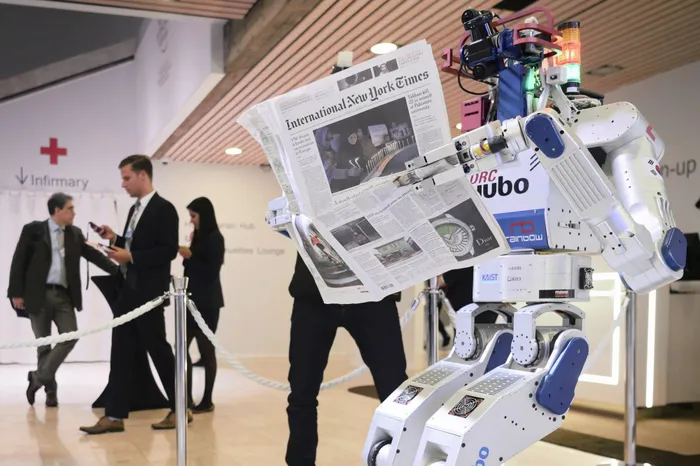Is the 4th Industrial Revolution worth it?

Picture: Laurent Gillieron/EPA – As the Fourth Industrial Revolution (4IR) continues to disrupt all industries with artificial intelligence (AI), robotic process automation (RPA) and machine learning (ML), to name a few, the world of work is changing at lightning speed. Indeed, the concept of a “job” itself, which was created by the First Industrial Revolution, may well be destroyed by the Fourth.
By Tibukele Bongiwe Ngwenyama
“Decision makers are too often caught in traditional, linear (and non-disruptive) thinking or too absorbed by immediate concerns to think strategically about the forces of disruption and innovation shaping our future.” ― Klaus Schwab
A vital component of the Fourth Industrial Revolution (4IR) is the rapid use of digital technology, including artificial intelligence (AI), cloud computing, robotics, and 3D printing. They have noticeable and significant implications for employment, education, and the future of work.
By 2070, the under-twenty population will be the world’s largest age group. Since young people have the most experience with the 4IR, they will be one of its most valuable resources. Using innovative technologies is crucial to increasing our competitiveness. Most industries have experienced much expansion in innovation and productivity as the fourth industrial revolution transforms the global economy and industrialisation in particular (4IR).
Since sustainability has become a crucial part of business in the twenty-first century, doing business as usual is no longer an option. It is well known that sustainability in business deals with human and environmental considerations where stakeholders like employees, employers, buyers, and consumers collaborate to achieve the desired prosperity and benefits for all.
South Africa has transformed its apparel industry significantly, improving worker rights, factory sanitation, capacity building for institutions, and safety. However, human considerations alone cannot determine an industry’s sustainability. Another essential component of sustainability is maintaining industrial innovation and competitiveness.
Since 1816, there have been four revolutions, and in each one, dire predictions of widespread job losses and declining living standards have been made. These worries were unfounded now that the first three had ended. Could there be a catch this time? Unpredictable changes are being made to social, economic, and political systems by disruptive technologies like artificial intelligence, robotics, blockchain, and 3D printing. It is hard to map the technology’s growth rate because it can be exponential, factorial, or greater. The difficulty of practical assessments is a result of this unpredictability.
Today’s jobs are a collection of tasks valid for workers of all skill levels. Millions of jobs are being automated, but are there any restrictions on how much work can be done in this way? Jobs that cannot be technically and cost-effectively mechanised, like being a social worker, are among the safer professions today.
For instance, even though most bank tellers’ tasks can be automated (Pepper), human interaction is still necessary. The hands of people are also very intricate. The robot might be able to assist you, but it will find it challenging to communicate with you on a human level so it will fall short of expectations. The focus on this severely ignores the higher-skilled occupations directly resulting from rising automation.
For instance, increased production process automation will call for more oversight and quality control. It will be necessary for humans to perform this task rather than leave it to machines.
The concept of human interaction is fading in relevance due to the technological revolution. That implies that we will struggle as humans to meet our basic requirements on a social and biological level.
It is hard to imagine a world where individuals never need to leave their houses since they can access everything they require. Software developers, marketing experts, authors, and financial advisors are all in more demand; however, the demand for accountants, administrative assistants, and mechanical technicians is declining.
Demand is shifting from repetitive tasks and limited abilities related to specific jobs to practical interpersonal, psychological, and non-repetitive cognitive skills. We are not prepared (South Africa is a failing economy in debt, investors are fleeing, skilled residents are leaving the country, there is a high unemployment rate, rising taxes, and no focus on recovering losses to move this economy forward), so are we truly prepared for high technology?
The 4IR offers a unique chance for nations to use technology to overcome development barriers quickly. Automation may lead to higher skill costs and wider income gaps, but it may also lead to higher productivity and the emergence of new professions. However, nations must reform their educational systems to prepare for the impending technological revolution.
All this negativity might, however, result in increased efforts to reskill and reshape the workforce. Ironically, this negativity could result in a lack of readiness, making it misguided. It is safer to overestimate than underestimate the potential cost of change to innocent victims during uncertain times.
Our success will depend on developing skills and efficiency for our people and creating decent jobs for them, and better jobs can be created by enhancing the skills and value of products. If technological advancement is our new horizon of opportunities, we must keep pace.
Ngwenyama, a University of Johannesburg BA Humanities graduate currently doing her Honours in Urban Sociology through the department of Sociology.
This article is exclusive to The African. To republish, see terms and conditions.